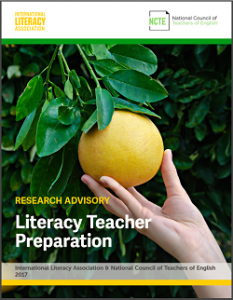Research
NCTE’s research programs and projects support, publish, and share current scholarship that aims to improve the quality of English language arts instruction at all educational levels.
What We Know about Literacy Teacher Preparation

Listen to Dr. Louann Reid from Colorado State and Dr.Victoria Risko of Vanderbilt University discuss this research advisory.
Read excerpts from their interview here.
Top-down educational policies of the past two decades have challenged the effectiveness of and the need for teacher preparation programs, leading to a proliferation of recommendations, regulations, and alternative pathways to teaching (e.g., National Council on Teacher Quality, use of value-added methods to measure teacher effectiveness, Teach for America, and Relay Graduate School of Education). When based on evidence-based practices and principles, innovation can support and has supported beneficial change, but many of the educational policies and alternative pathways in recent years have had little research to support them. Yet their impact on the public understanding of teaching and learning has been significant, driving continuous discussions about improving teacher education. One constant message has been that teachers and teacher quality matter. It follows that the programs that prepare teachers also matter.
Concerned in particular about the misconceptions regarding literacy teacher preparation and recognizing the importance of educating teachers entering the profession, the International Literacy Association (ILA) and the National Council of Teachers of English (NCTE) brought together a task force charged to review and analyze the research on teacher preparation for literacy instruction. This effort arose from frustration and disappointment with frequently repeated mistaken claims about literacy teacher education—what Zeichner and Conklin (2016) called the “echo chamber” effect.
Our extensive review and analysis of research in literacy teacher education counters the narrowness and repetition of political discourses about teacher education. It provides a set of defining, evidence-based characteristics of teacher education practices that are associated with advancing prospective teachers’ learning and classroom performance and have implications for teacher education programs and public policy.
There is substantial evidence documenting the impact of teacher preparation courses and field-based experiences for advancing prospective teachers’ learning and teaching capabilities, despite a lack of funding for large-scale longitudinal studies that follow prospective teachers across their course work and into their initial teaching years. Yet public discussions and policies that dismiss the power and impact of teacher preparation course work leading to initial teacher certification largely fail to reference this evidence. This body of evidence stands in contrast to examinations of alternate and truncated/fast track teacher education programs where, despite years of research, there is no consistent evidence of effectiveness for teacher preparation (Darling-Hammond, 2006).
From our analysis, we have identified a convergence of evidence that supports our conclusions. This convergence is based on (a) evidence across numerous studies that are course based and/or field based, are activity specific, and document teacher learning and practices and (b) evidence taken from systematic analyses of effective literacy teacher preparation programs. The advantage of deliberate examination of convergence is to build a systematic body of evidence (Cochran-Smith & Zeichner, 2005) and to link preparatory practices to outcomes of teacher learning and teacher practice. Noting a much smaller set of studies that investigates impact on students’ literacy achievement, we also have identified practices implemented by beginning teachers that are associated with student gains.
Evidence shows that the practices we have identified have a history of demonstrated effectiveness across course work and programs and hold promise to be sustainable and support teacher learning beyond short-term testing of impact. To this last point, for example, longitudinal studies have indicated that by the second and third years of teaching, teachers are drawing on their professional knowledge from their preparation programs to guide their teaching practices, whereas this knowledge in practice may not be observed during the first year of teaching when teachers are trying to reconcile new routines with previous expectations (Boyd, Grossman, Lankford, Loeb, & Wyckoff, 2009).
Read this full report to learn about the four critical quality indicators we identified for prospective teachers’ learning and new teachers’ perfomance
This report was created by the International Literacy Association and National Council of Teachers of English Task Force on Literacy Teacher Preparation
Victoria J. Risko, Cochair, Vanderbilt University
Louann Reid, Cochair, Colorado State University
James Hoffman, University of Texas, Austin
Luke Rodesiler, Indiana University–Purdue University Fort Wayne
Allison Skerrett, University of Texas, Austin
William Teale, University of Illinois at Chicago
with Melanie Shoffner, Purdue University, and Vivian Vasquez, American University
Diane Barone, Immediate Past President, International Literacy Association, University of Nevada, Reno; William Teale, President and Board Liaison, International Literacy Association, University of Illinois at Chicago; Marcie Craig Post, Executive Director, International Literacy Association
